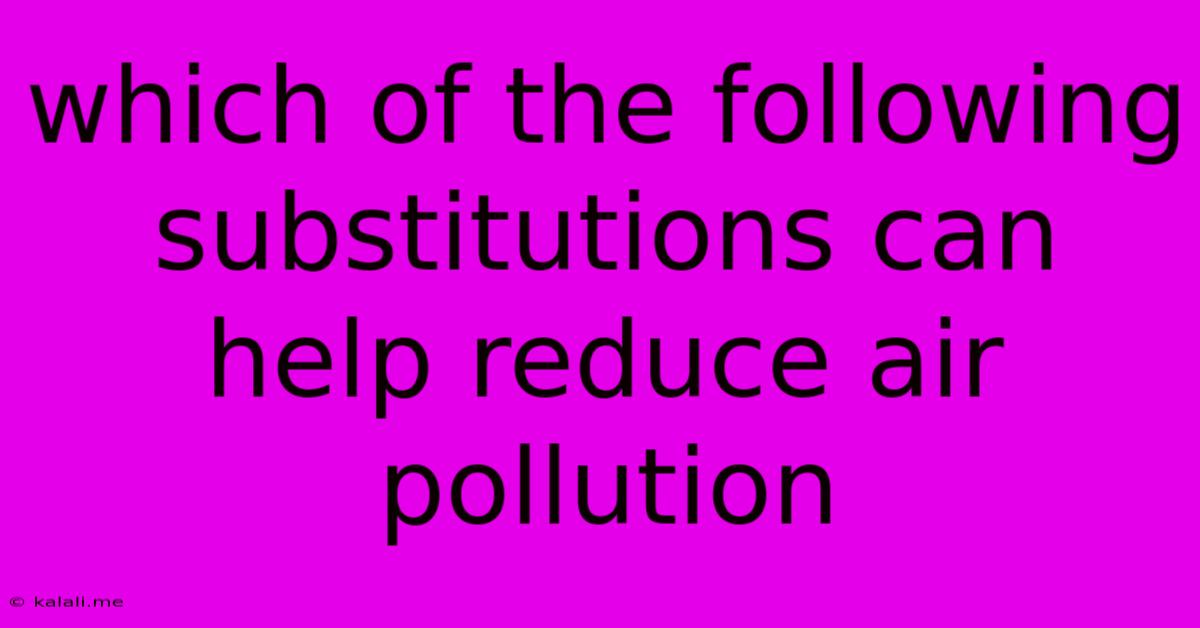Which Of The Following Substitutions Can Help Reduce Air Pollution
Kalali
May 08, 2025 · 3 min read

Table of Contents
Which Substitutions Can Help Reduce Air Pollution?
Air pollution is a significant global issue, impacting human health and the environment. Reducing air pollution requires a multifaceted approach, and making conscious substitutions in our daily lives can contribute significantly. This article explores several key areas where substitutions can make a tangible difference in improving air quality. We'll delve into practical alternatives that minimize harmful emissions and contribute to a cleaner, healthier planet.
Transportation: Shifting Away from Fossil Fuels
The transportation sector is a major contributor to air pollution, primarily due to emissions from gasoline and diesel vehicles. Switching to cleaner transportation alternatives is crucial.
-
Public Transportation: Opting for buses, trains, subways, or trams significantly reduces per-person emissions compared to driving alone. Carpooling is another effective strategy, sharing the burden of emissions among multiple passengers.
-
Electric Vehicles (EVs): EVs produce zero tailpipe emissions, contributing significantly to cleaner air, especially in urban areas. While the electricity generation process itself might involve emissions, the overall impact is considerably lower than that of gasoline or diesel vehicles. Consider factors like battery production and charging infrastructure when evaluating the overall environmental impact.
-
Cycling and Walking: For shorter distances, cycling and walking are excellent choices. These modes are emission-free and promote physical health. Prioritizing these options for errands and commutes makes a positive impact on local air quality.
-
Biofuels: While not entirely emission-free, biofuels offer a potentially more sustainable alternative to fossil fuels, depending on their production method. Research and development in this area are ongoing, aiming to improve their efficiency and reduce their environmental footprint.
Energy Consumption: Transitioning to Renewable Sources
The energy sector plays a vital role in air pollution levels. Shifting towards renewable energy sources is paramount.
-
Solar Power: Harnessing solar energy through photovoltaic panels reduces reliance on fossil fuel-based electricity generation, significantly lowering greenhouse gas emissions and air pollutants.
-
Wind Power: Wind turbines convert wind energy into electricity, offering a clean and sustainable energy source. Wind farms contribute to a cleaner energy mix and reduce air pollution associated with traditional power plants.
-
Energy Efficiency: Improving energy efficiency through better insulation, energy-efficient appliances, and responsible consumption habits reduces the overall energy demand and consequently, the emissions associated with energy production. Simple changes like switching to LED lighting can make a substantial difference.
Industrial Processes: Cleaner Technologies and Practices
Industrial activities often release significant amounts of pollutants into the atmosphere. Adopting cleaner technologies and practices is crucial.
-
Emission Control Technologies: Industries should invest in and utilize advanced emission control technologies, such as scrubbers and filters, to reduce the pollutants released into the atmosphere.
-
Sustainable Manufacturing: Implementing sustainable manufacturing practices, including waste reduction, recycling, and the use of eco-friendly materials, minimizes the environmental impact of industrial processes.
-
Renewable Energy Integration: Industries can significantly reduce their carbon footprint by integrating renewable energy sources into their operations.
Household Choices: Everyday Substitutions for a Cleaner Environment
Even small changes in our daily routines can collectively contribute to improved air quality.
-
Switching to Eco-Friendly Cleaning Products: Many conventional cleaning products release volatile organic compounds (VOCs), which contribute to air pollution. Opting for natural and eco-friendly alternatives minimizes these emissions.
-
Reducing Meat Consumption: Livestock farming is a significant source of greenhouse gas emissions. Reducing meat consumption, especially red meat, can help lower these emissions.
-
Proper Waste Management: Improper waste disposal contributes to air pollution through the release of methane and other harmful gases. Recycling, composting, and proper waste management practices reduce these emissions.
By consciously making these substitutions in transportation, energy consumption, industrial processes, and household choices, we can collectively contribute to a significant reduction in air pollution and create a healthier environment for ourselves and future generations. While individual actions may seem small, their cumulative effect is powerful and essential in addressing this global challenge.
Latest Posts
Latest Posts
-
What Is 32 Oz Of Water In Litres
May 09, 2025
-
How Long Does It Take Mountains To Form
May 09, 2025
-
What Does A Triangle With A Circle Inside Mean
May 09, 2025
-
Where Is Microphone On Acer Chromebook
May 09, 2025
-
How Many Feet In 48 In
May 09, 2025
Related Post
Thank you for visiting our website which covers about Which Of The Following Substitutions Can Help Reduce Air Pollution . We hope the information provided has been useful to you. Feel free to contact us if you have any questions or need further assistance. See you next time and don't miss to bookmark.